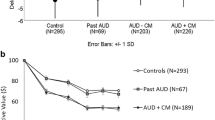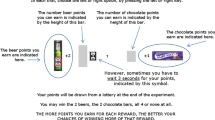Abstract
Despite real-world implications, the pattern of delay discounting in alcohol users when the commodities now and later differ has not been well-characterized. In this study, 60 participants on Amazon’s Mechanical Turk completed the Alcohol Use Disorder Identification Test (AUDIT) to assess severity of use and completed four delay discounting tasks between hypothetical, equivalent amounts of alcohol and money available at five delays. The tasks included two cross-commodity (alcohol now-money later and money now-alcohol later) and two same-commodity (money now-money later and alcohol now-alcohol later) conditions. Delay discounting was significantly associated with clinical cutoffs of the AUDIT for both of the cross-commodity conditions but not for either of the same-commodity delay discounting tasks. The cross-commodity discounting conditions were related to severity of use wherein heavy users discounted future alcohol less and future money more. The change in direction of the discounting effect was dependent on the commodity that was distally available suggesting a distinctive pattern of discounting across commodities when comparing light and heavy alcohol users.



Similar content being viewed by others
References
Alessi, S. M., & Petry, N. M. (2003). Pathological gambling severity is associated with impulsivity in a delay discounting procedure. Behavioural Processes, 64(3), 345–354.
Barbor, T. F., Higgins-Biddle, J. C., Saunders, J. B., & Monteiro, M. G. (2001). Alcohol Use Disorders Identification Test (AUDIT): Guidelines for use in primary care (No. 2nd edition). World Health Organization. Retrieved from http://www.talkingalcohol.com/files/pdfs/WHO_audit.pdf.
Bickel, W. K., George Wilson, A., Franck, C. T., Terry Mueller, E., Jarmolowicz, D. P., Koffarnus, M. N., & Fede, S. J. (2014a). Using crowdsourcing to compare temporal, social temporal, and probability discounting among obese and non-obese individuals. Appetite, 75, 82–89.
Bickel, W. K., Johnson, M. W., Koffarnus, M. N., MacKillop, J., & Murphy, J. G. (2014b). The behavioral economics of substance use disorders: Reinforcement pathologies and their repair. Annual Review of Clinical Psychology, 10, 641–677.
Bickel, W. K., Landes, R. D., Christensen, D. R., Jackson, L., Jones, B. A., Kurth-Nelson, Z., & Redish, A. D. (2011). Single- and cross-commodity discounting among cocaine addicts: The commodity and its temporal location determine discounting rate. Psychopharmacology, 217(2), 177–187.
Borges, A. M., Kuang, J., Milhorn, H., & Yi, R. (2016). An alternative approach to calculating Area-Under-the-Curve (AUC) in delay discounting research. Journal of the Experimental Analysis of Behavior, 106(2), 145–155.
Cohen, J. (1988). Statistical power analysis for the behavioral sciences (pp. 20–26). Hillsdale: Lawrence Earlbaum Associates.
Du, W., Green, L., & Myerson, J. (2002). Cross-cultural comparisons of discounting delayed and probabilistic rewards. The Psychological Record, 52(4), 479.
Graphpad Software. (2015). Prism (Version 6.0f for Mac OS X). Retrieved from www.graphpad.com.
Herrmann, E. S., Johnson, P. S., & Johnson, M. W. (2015). Examining delay discounting of condom-protected sex among men who have sex with men using crowdsourcing technology. AIDS and Behavior, 19(9), 1655–1665.
Johnson, M. W., & Bickel, W. K. (2008). An algorithm for identifying nonsystematic delay-discounting data. Experimental and Clinical Psychopharmacology, 16(3), 264–274.
Johnson, M. W., Bickel, W. K., Baker, F., Moore, B. A., Badger, G. J., & Budney, A. J. (2010). Delay discounting in current and former marijuana-dependent individuals. Experimental and Clinical Psychopharmacology, 18(1), 99–107.
Johnson, M. W., Bickel, W. K., & Baker, F. (2007). Moderate drug use and delay discounting: A comparison of heavy, light, and never smokers. Experimental and Clinical Psychopharmacology, 15(2), 187–194.
Johnson, N. B., Hayes, L. D., Brown, K., Hoo, E. C., Ethier, K. A., for Disease Control, C., … Others. (2014). CDC National Health Report: Leading causes of morbidity and mortality and associated behavioral risk and protective factors—United States, 2005--2013. Morbidity and Mortality Weekly Report. Surveillance Summaries, 63(Suppl 4), 3–27.
Johnson, P. S., Herrmann, E. S., & Johnson, M. W. (2015). Opportunity costs of reward delays and the discounting of hypothetical money and cigarettes. Journal of the Experimental Analysis of Behavior, 103(1), 87–107.
Kirby, K. N., Petry, N. M., & Bickel, W. K. (1999). Heroin addicts have higher discount rates for delayed rewards than non-drug-using controls. Journal of Experimental Psychology General, 128(1), 78–87.
MacKillop, J. (2016). The behavioral economics and neuroeconomics of alcohol use disorders. Alcoholism, Clinical and Experimental Research, 40(4), 672–685.
MacKillop, J., Amlung, M. T., Few, L. R., Ray, L. A., Sweet, L. H., & Munafò, M. R. (2011). Delayed reward discounting and addictive behavior: A meta-analysis. Psychopharmacology, 216(3), 305–321.
McKerchar, T. L., & Mazur, J. E. (2016). Human choices between variable and fixed rewards in hypothetical variable-delay and double-reward discounting procedures. Journal of the Experimental Analysis of Behavior, 106(1), 1–21.
Mellis, A. M., Woodford, A. E., Stein, J. S., & Bickel, W. K. (2017). A second type of magnitude effect: Reinforcer magnitude differentiates delay discounting between substance users and controls. Journal of the Experimental Analysis of Behavior, 107(1), 151–160.
Meredith, S. E., Sweeney, M. M., Johnson, P. S., Johnson, M. W., & Griffiths, R. R. (2016). Weekly energy drink use is positively associated with delay discounting and risk behavior in a nationwide sample of young adults. Journal of Caffeine Research, 6(1), 10–19.
Mitchell, S. H. (2004). Effects of short-term nicotine deprivation on decision-making: Delay, uncertainty and effort discounting. Nicotine & Tobacco Research: Official Journal of the Society for Research on Nicotine and Tobacco, 6(5), 819–828.
Moody, L., Franck, C., Hatz, L., & Bickel, W. K. (2016a). Impulsivity and polysubstance use: A systematic comparison of delay discounting in mono-, dual-, and trisubstance use. Experimental and Clinical Psychopharmacology, 24(1), 30–37.
Moody, L., Franck, C., & Bickel, W. K. (2016b). Comorbid depression, antisocial personality, and substance dependence: Relationship with delay discounting. Drug and Alcohol Dependence, 160, 190–196.
Myerson, J., Green, L., & Warusawitharana, M. (2001). Area under the curve as a measure of discounting. Journal of the Experimental Analysis of Behavior, 76(2), 235–243.
Paolacci, G., & Chandler, J. (2014). Inside the Turk: Understanding mechanical Turk as a participant pool. Current Directions in Psychological Science, 23(3), 184–188.
Petry, N. M. (2001). Delay discounting of money and alcohol in actively using alcoholics, currently abstinent alcoholics, and controls. Psychopharmacology, 154(3), 243–250.
R Core Team. (2014). R: A language and environment for statistical computing. Vienna: R Foundation for Statistical Computing. 2013.
Reed, D. D., Becirevic, A., Atchley, P., Kaplan, B. A., & Liese, B. S. (2016). Validation of a novel delay discounting of text messaging questionnaire. The Psychological Record, 66(2), 253–261.
Sacks, J. J., Gonzales, K. R., Bouchery, E. E., Tomedi, L. E., & Brewer, R. D. (2015). 2010 national and state costs of excessive alcohol consumption. American Journal of Preventive Medicine, 49(5), e73–e79.
Saunders, J. B., Aasland, O. G., Babor, T. F., de La Fuente, J. R., & Grant, M. (1993). Development of the alcohol use disorders identification test (AUDIT): WHO collaborative project on early detection of persons with harmful alcohol consumption-II. Addiction, 88(6), 791–804.
Stahre, M., Roeber, J., Kanny, D., Brewer, R. D., & Zhang, X. (2014). Contribution of excessive alcohol consumption to deaths and years of potential life lost in the United States. Preventing Chronic Disease, 11, E109.
Weatherly, J. N., Terrell, H. K., & Derenne, A. (2010). Delay discounting of different commodities. The Journal of General Psychology, 137(3), 273–286.
Wesley, M. J., Lohrenz, T., Koffarnus, M. N., McClure, S. M., De La Garza, R., 2nd, Salas, R., … Montague, P. R. (2014). Choosing money over drugs: The neural underpinnings of difficult choice in chronic cocaine users. Journal of Addiction, 2014, 189853.
Yoon, J. H., Higgins, S. T., Bradstreet, M. P., Badger, G. J., & Thomas, C. S. (2009). Changes in the relative reinforcing effects of cigarette smoking as a function of initial abstinence. Psychopharmacology, 205(2), 305–318.
Author information
Authors and Affiliations
Corresponding author
Ethics declarations
Funding
This study was funded by NIAAA R01AA021529 and LNM’s time was funded by NIAAA F31AA024368.
Conflict of Interest
LNM, LMP, WKB have no conflicts of interest to report.
Ethical Approval
All procedure performed in studies involving human participants were in accordance with the ethical standards of the institutional and/or national research committee and with the 1964 Helsinki Declaration and its later amendments or comparable ethical standards. Informed consent was obtained from all individual participants included in the study.
Rights and permissions
About this article
Cite this article
Moody, L.N., Tegge, A.N. & Bickel, W.K. Cross-Commodity Delay Discounting of Alcohol and Money in Alcohol Users. Psychol Rec 67, 285–292 (2017). https://doi.org/10.1007/s40732-017-0245-0
Published:
Issue Date:
DOI: https://doi.org/10.1007/s40732-017-0245-0




